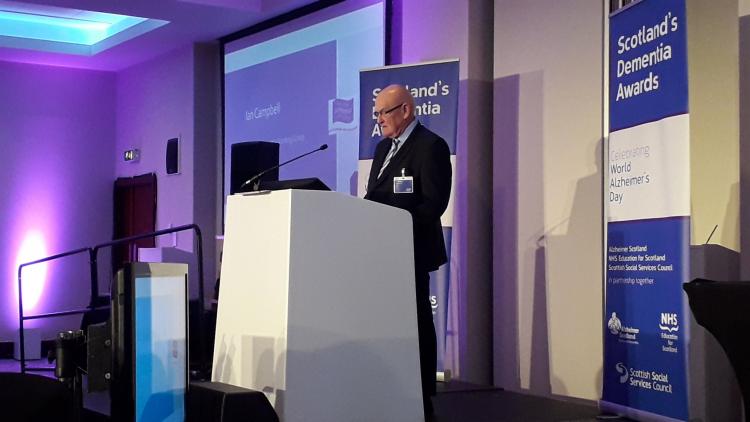Ian’s Story
Ian talks about his diagnosis, the impact lockdown had on his life, and why being a campaigner is so important to him.

About me
I started work in the shipyards before becoming a long distance lorry driver, a career that took me all over Britain. After retirement, in 2016 at the age of 62, I was diagnosed with Alzheimer’s Disease and Vascular Dementia. I joined the Scottish Dementia Working Group (SDWG) in 2018 and have been an active member ever since. I am a passionate campaigner on living well with dementia, and also on acute care. I live in Glasgow with my wife and we have four children, seven grandchildren and seven great grandchildren. I’d like to share with you my experience of receiving my diagnosis, the impact that the Covid 19 pandemic has had on my life, and how I live well with dementia.
My diagnosis
I first met with doctors because I thought that something was wrong with my memory. You know that something is not right because every day you forget things. I went to the hospital for brain scans, and after a few years of testing I was diagnosed with dementia. I was 62 years old. While learning about my diagnosis, there have been a few experiences with medical professionals that have been challenging. On first hearing about my diagnosis, a medical professional came into the room saying, “you have dementia, predominantly Alzheimer’s, and Vascular” and then walked out of the room leaving my wife and I there. I left the hospital with just a bit of paper. I was wondering if Alzheimer’s Disease and dementia were two different things – I just didn’t know. I will never forget that day. It wasn’t that I received the diagnosis, it was the way I was told. I would like to suggest to medical professionals that they offer a couple of minutes of their time to the person being diagnosed, and their family, to process the information they have just been given and explain what it means. I’d like to see more coverage of dementia on television and the media, where people are raising awareness and challenging preconceptions. I believe there should be more conversations about the different symptoms of dementia too. Most people just think it’s memory loss and it’s not. There can be other symptoms like mood swings, depression, anger, frustration, and difficulty in managing finances. I made the decision that I was going to raise awareness about dementia. I have, and I think it has helped me and I hope others too.
“I believe there should be more conversation about the different symptoms of dementia. Most people think it’s just about memory loss and it’s not.”
My life and the pandemic
My wife and I have always had a good laugh together. We will be celebrating our 50th wedding anniversary this year! Before the Covid 19 pandemic, we’d go and visit our family and they’d come to our home. It’s a big change missing out on all of that. Before lockdown, my wife and I were in three or four support groups and we were out every day. The support groups have been so helpful as you feel comfortable participating because you know others can relate to you as they’ve had similar experiences as well. We also travelled on the train quite a lot before lockdown. We were always trying to stay active and so the pandemic has had a big impact on our daily lives. Now I’ve been sitting in the house and I’m getting used to it. When things go back to normal, it’s going to take me a good while to get used to the noise and the people again. Sensitivity to noise is one of my dementia symptoms. One of the hardest things is not seeing my grandchildren. My son and daughter bring our groceries to the front door and leave. My family come to the door for a visit but don’t come inside as they are trying to keep us safe.
I’ve found a few exciting things to keep me active during the pandemic. I go to a Football Memories group. One of them started virtually a few months ago and it’s been great. We meet once a month and it’s really something to look forward to. During a meeting you may even remember a game you’ve been to. The activity on the group can trigger your brain to remember. I would say to anyone living with this condition that joining groups is crucial. I’ve seen people come out of their shells. We have a laugh and we reminisce.
I also thoroughly enjoy engaging with my iPad and doing my jigsaw puzzles. It’s helped me enormously. When you’re engaging in activities you’re always thinking, and your brain is working. I engage in brain activity every day and sometimes a few times each day. Some people in Scotland living with dementia don’t have access to smart phones, iPads or anything like this. I’m fortunate I get an activity package from Alzheimer Scotland every month.
“I couldn’t imagine sitting here without Alzheimer Scotland, throughout the pandemic they have continued to raise awareness and respond to needs.”
I think it’s imperative that you don’t just sit in the house and dwell. You’ve got to try and get to groups and be involved with different things. It’s a massive help to your overall health and wellbeing. As a member of the SDWG, I continue to raise awareness and advocate for everyone getting access to the information and support they need.